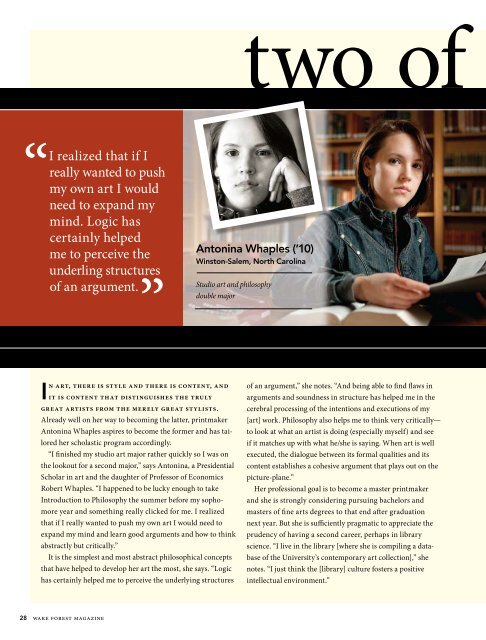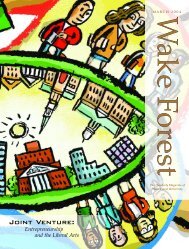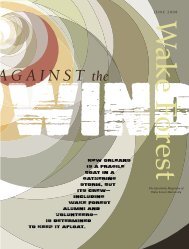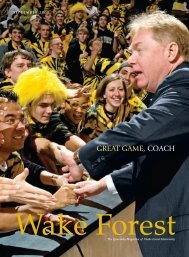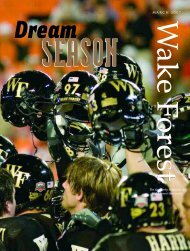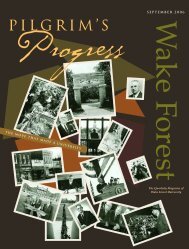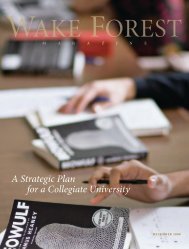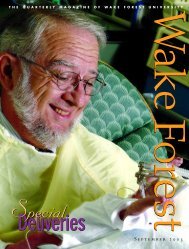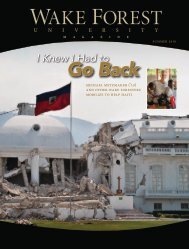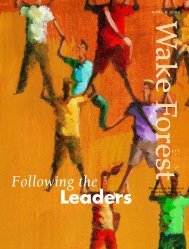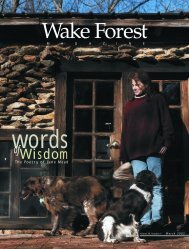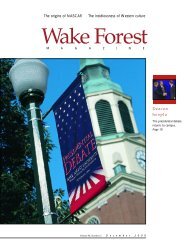Wake Forest Magazine, June 2009 - Past Issues - Wake Forest ...
Wake Forest Magazine, June 2009 - Past Issues - Wake Forest ...
Wake Forest Magazine, June 2009 - Past Issues - Wake Forest ...
Create successful ePaper yourself
Turn your PDF publications into a flip-book with our unique Google optimized e-Paper software.
two of<br />
“<br />
I realized that if I<br />
really wanted to push<br />
my own art I would<br />
need to expand my<br />
mind. Logic has<br />
certainly helped<br />
me to perceive the<br />
underling structures<br />
of an argument.<br />
”<br />
Antonina Whaples (’10)<br />
Winston-Salem, North Carolina<br />
Studio art and philosophy<br />
double major<br />
In art, there is style and there is content, and<br />
it is content that distinguishes the truly<br />
great artists from the merely great stylists.<br />
Already well on her way to becoming the latter, printmaker<br />
Antonina Whaples aspires to become the former and has tailored<br />
her scholastic program accordingly.<br />
“I finished my studio art major rather quickly so I was on<br />
the lookout for a second major,” says Antonina, a Presidential<br />
Scholar in art and the daughter of Professor of Economics<br />
Robert Whaples. “I happened to be lucky enough to take<br />
Introduction to Philosophy the summer before my sophomore<br />
year and something really clicked for me. I realized<br />
that if I really wanted to push my own art I would need to<br />
expand my mind and learn good arguments and how to think<br />
abstractly but critically.”<br />
It is the simplest and most abstract philosophical concepts<br />
that have helped to develop her art the most, she says. “Logic<br />
has certainly helped me to perceive the underlying structures<br />
of an argument,” she notes. “And being able to find flaws in<br />
arguments and soundness in structure has helped me in the<br />
cerebral processing of the intentions and executions of my<br />
[art] work. Philosophy also helps me to think very critically—<br />
to look at what an artist is doing (especially myself) and see<br />
if it matches up with what he/she is saying. When art is well<br />
executed, the dialogue between its formal qualities and its<br />
content establishes a cohesive argument that plays out on the<br />
picture-plane.”<br />
Her professional goal is to become a master printmaker<br />
and she is strongly considering pursuing bachelors and<br />
masters of fine arts degrees to that end after graduation<br />
next year. But she is sufficiently pragmatic to appreciate the<br />
prudency of having a second career, perhaps in library<br />
science. “I live in the library [where she is compiling a database<br />
of the University’s contemporary art collection],” she<br />
notes. “I just think the [library] culture fosters a positive<br />
intellectual environment.”<br />
28 wake forest magazine


